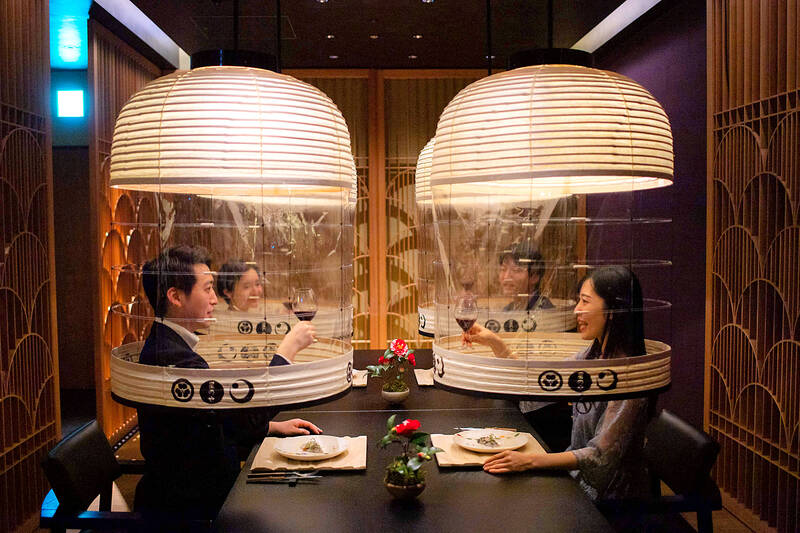It is a linguistic trap few learners of Japanese have avoided: declaring yourself pera pera (fluent in a language) when you’re really peko peko (hungry); or breaking into applause (pachi pachi) when the dentist asks you to kachi kachi (bite repeatedly).
Navigating the rich and varied world of Japanese onomatopoeia can result in laughter and mild embarrassment, but the words can also be a quick and effective way to get through to a friend or colleague.
As Japan’s foreign population reaches record levels, lifted by the arrival of more people to fill a gaping hole in the labour market, volunteers in the western prefecture of Mie have compiled a guide to commonly used onomatopoeic words for language learners.

Photo: AFP
The book, E Kara Oto ga Wakaru Hon (understanding sounds using pictures) was the idea of Masao Hara, the deputy head of a nonprofit in the prefecture whose interactions with non-Japanese convinced him the guide would come in useful.
It contains a host of words that can be used in everyday situations, such as a visit to the doctor, who might hear of their patient’s throbbing (zuki zuki) ankle or pounding (gan gan) headache, a piri piri (stinging) insect bite or muzu muzu (scratchy) throat.
Hara and other members of the nonprofit sifted through a Japanese dictionary to create a list of 100 words, according to the Mainichi Shimbun newspaper.
They are divided into categories — from actions and emotions to the weather and descriptions of inanimate objects — and accompanied by an illustration and descriptions in Chinese, Vietnamese, Nepalese and Indonesian.
Wan Fang, a Chinese resident, said the guide had already made her job at a supermarket a little easier.
“When I was told that the floor was tsuru tsuru in Japanese, I didn’t know what it meant, but when I saw the illustration in the book, I instantly understood that tsuru tsuru means the floor is clean or slippery,” Wan told the newspaper.
The print run of 1,000 copies is expected to find a keen readership among students attending local Japanese language schools — as of January, Mie was home to 31,000 foreign residents. Nationwide, the non-Japanese population reached a record 3.2 million last year, according to the immigration services agency.
The guide only scratches the surface, however. There are said to be more than 1,000 onomatopoeia in Japanese — enough to make most language learners come over all fura fura (dizzy).

Wooden houses wedged between concrete, crumbling brick facades with roofs gaping to the sky, and tiled art deco buildings down narrow alleyways: Taichung Central District’s (中區) aging architecture reveals both the allure and reality of the old downtown. From Indigenous settlement to capital under Qing Dynasty rule through to Japanese colonization, Taichung’s Central District holds a long and layered history. The bygone beauty of its streets once earned it the nickname “Little Kyoto.” Since the late eighties, however, the shifting of economic and government centers westward signaled a gradual decline in the area’s evolving fortunes. With the regeneration of the once

Even by the standards of Ukraine’s International Legion, which comprises volunteers from over 55 countries, Han has an unusual backstory. Born in Taichung, he grew up in Costa Rica — then one of Taiwan’s diplomatic allies — where a relative worked for the embassy. After attending an American international high school in San Jose, Costa Rica’s capital, Han — who prefers to use only his given name for OPSEC (operations security) reasons — moved to the US in his teens. He attended Penn State University before returning to Taiwan to work in the semiconductor industry in Kaohsiung, where he

In February of this year the Taipei Times reported on the visit of Lienchiang County Commissioner Wang Chung-ming (王忠銘) of the Chinese Nationalist Party (KMT) and a delegation to a lantern festival in Fuzhou’s Mawei District in Fujian Province. “Today, Mawei and Matsu jointly marked the lantern festival,” Wang was quoted as saying, adding that both sides “being of one people,” is a cause for joy. Wang was passing around a common claim of officials of the People’s Republic of China (PRC) and the PRC’s allies and supporters in Taiwan — KMT and the Taiwan People’s Party — and elsewhere: Taiwan and

On May 2, Chinese Nationalist Party (KMT) Chairman Eric Chu (朱立倫), at a meeting in support of Taipei city councilors at party headquarters, compared President William Lai (賴清德) to Hitler. Chu claimed that unlike any other democracy worldwide in history, no other leader was rooting out opposing parties like Lai and the Democratic Progressive Party (DPP). That his statements are wildly inaccurate was not the point. It was a rallying cry, not a history lesson. This was intentional to provoke the international diplomatic community into a response, which was promptly provided. Both the German and Israeli offices issued statements on Facebook